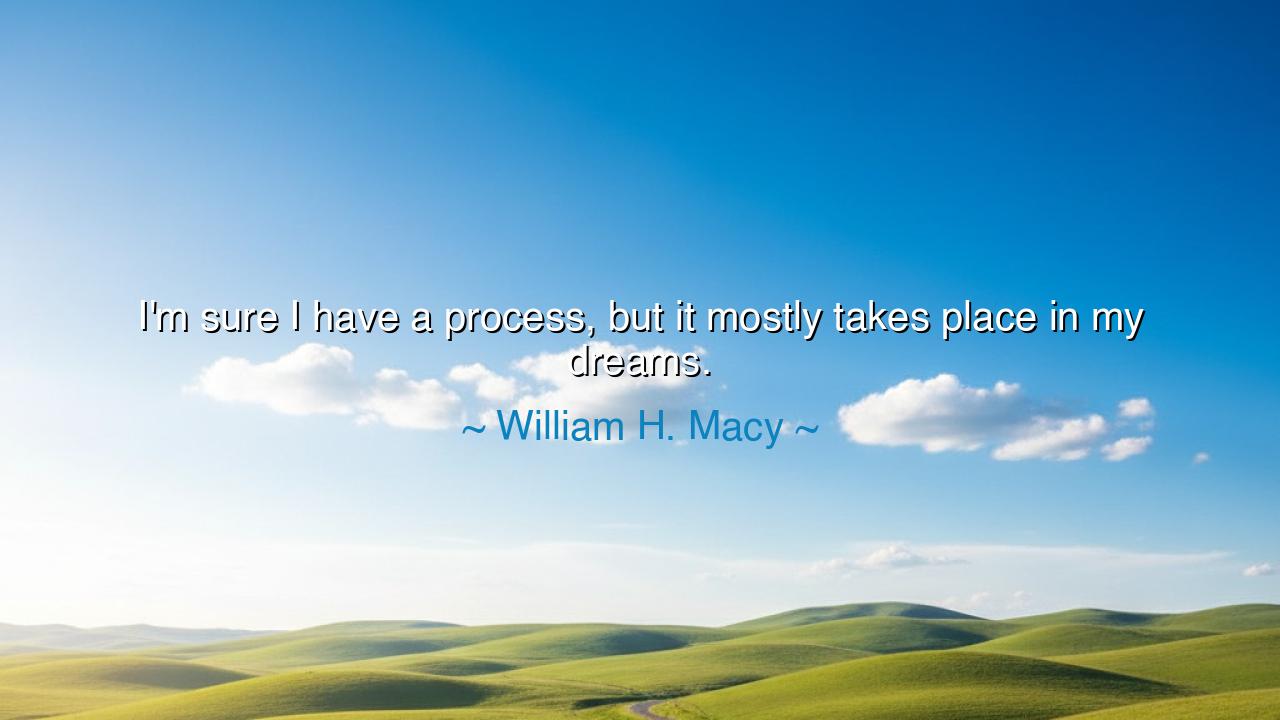
I'm sure I have a process, but it mostly takes place in my






The words of William H. Macy, “I’m sure I have a process, but it mostly takes place in my dreams,” speak with the humility of an artist who has long since made peace with the mystery of his craft. Beneath their gentle humor lies a profound truth about creativity, intuition, and the unseen forces that shape human expression. Macy—an actor known for his subtlety, intelligence, and emotional depth—reveals here that much of creation is not born from conscious labor alone, but from the quiet, hidden workings of the unconscious mind. The ancients, too, knew this truth: that inspiration does not always come from the waking mind, but from the dream-state, where reason loosens its grip and the soul speaks in symbols and fire.
To say that one’s process “takes place in dreams” is to confess that art is not wholly controlled, that the artist is as much vessel as craftsman. There are moments when thought ceases to be deliberate, and yet ideas bloom like stars in darkness. The mind, untethered from its daily struggles, roams freely through imagination, weaving connections that waking logic cannot. Macy’s reflection is not one of confusion, but of reverence—for he understands that the creative process is not a formula to be mastered, but a mystery to be honored. He speaks as one who knows that sometimes the truest work happens when we are not working at all, when the mind is silent and the dream takes over.
The ancients would have recognized this as the voice of muse and mystery. The Greeks spoke of Mnemosyne and the Muses, divine forces that whispered poetry, music, and vision into mortal minds. Even Socrates claimed that his wisdom was guided by an inner voice—his daimonion—which spoke from beyond reason. And in the East, the sages of old meditated upon the dream as a sacred mirror, a place where the boundaries between self and cosmos dissolved. All saw that human creativity does not arise from effort alone, but from harmony with the unseen realms within us. Thus, Macy’s words are the modern echo of an ancient philosophy: that true inspiration dwells not in constant striving, but in surrender to the deeper rhythms of the soul.
Consider the story of Elias Howe, the inventor of the sewing machine. For years he struggled, unable to design a needle that could stitch automatically. Exhausted, he fell into a dream. In it, he was captured by tribesmen who held spears with holes near their tips. In terror, he realized that the very thing he had sought in waking life was before him—the secret of the needle’s eye near the point, not the base. When he awoke, he built the design exactly as in his dream, and his invention changed the world. Here, too, the process took place in dreams, where the creative spirit roams unburdened by the logic of waking thought. Howe’s dream was no accident—it was his deeper mind, working silently, revealing truth when he had finally learned to let go.
So it is with all who create—writers, artists, scientists, dreamers alike. The act of creation demands both discipline and surrender. One must prepare the soil with study and practice, but the seeds are watered by the mysterious rains of the unconscious. The dreaming mind connects threads unseen by reason; it transforms confusion into revelation. Macy’s gentle remark, then, becomes a meditation on trust: the faith that our inner worlds know what we do not, that if we listen to their quiet murmurings, wisdom will find its way to the surface.
There is also humility in his words—a recognition that mastery is not dominion, but collaboration with forces greater than oneself. The proud believe that creativity is conquered by willpower; the wise know it is awakened through receptivity. The dreamer is not idle—he is listening, waiting, attuned to the whispers of the infinite. Just as the farmer cannot command the rain but must be ready when it comes, the artist must till his craft, trusting that inspiration will descend when the season is right.
And so, from Macy’s reflection, a lesson emerges for all who seek to create or to understand themselves: cultivate both effort and openness. Work with diligence in the light of day, but leave room for the wisdom of night. Do not demand that every insight come through logic; some truths must arrive like dreams, sudden and strange. Before you sleep, ponder your work, but release it into the realm of possibility—allow the mystery within you to complete what your mind cannot.
For in the end, the greatest creations of humanity—whether art, invention, or love—are born not merely of process, but of dream. The ancients called it divine inspiration; we call it intuition. Yet the essence remains the same: when reason sleeps, imagination awakens, and through that dream, the world itself is renewed. Therefore, honor your dreams, for they are not mere phantoms—they are the hidden workshop of your soul, where creation itself takes shape in silence.






AAdministratorAdministrator
Welcome, honored guests. Please leave a comment, we will respond soon